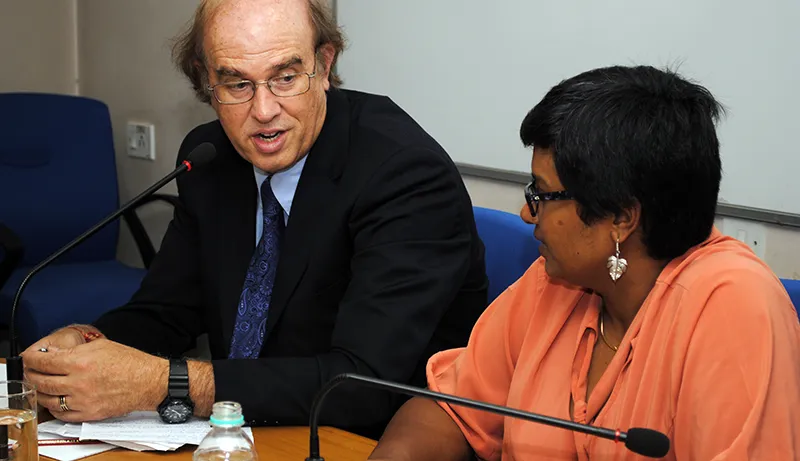A great game is evolving among India, China and the US in the Asia-Pacific region and the triangular relationship will be the most important relationship of the 21st century, Dr. Stephen Burges said.

A great game is evolving among India, China and the US in the Asia-Pacific region and the triangular relationship will be the most important relationship of the 21st century, international security studies professor at the U.S. Air War College, Dr. Stephen F. Burgess, noted during an interaction on the US ’rebalancing’ strategy towards the Asia-Pacific region and the impact on Indo-US relations at the Observer Research Foundation on August 19, 2013. The three powers have stakes in the Indian Ocean, while India and China have border issues to resolve. Competition for influence between India and China in their peripheries are also causing problems for the relationship.
Giving an overview of Indo-US ties in the backdrop of the US rebalancing strategy in the Asia-Pacific, Dr. Burgress described the India-US civil nuclear deal as a "crowning jewel" in the India-US relationship.
Dr Burgess noted that since November 2011, the US has shifted its focus from the Middle East (West Asia) to Asia. Consequently, India was expected to play a major role in this ’rebalance’ to Asia. The pursuance of the rebalancing strategy has created a perception of ’containing China’. In this context, an issue that stood out was the possibility of a confrontation between China and Japan. Explaining the "dangers" involved in pursuing this strategy, he remarked that the actions of the US were inciting China to take reciprocal measures and seek alliances to balance the US. On the economic side of the ’rebalance’, he believed that Trans-Pacific Partnership (TPP) was important to the US as also the East Asia Summit was significant in this regard.
The US faces the threat of being militarily pushed out of the Pacific islands, he noted. China has been developing its anti-satellite, anti-ship missile and anti-submarine warfare capabilities, as well as developing its anti-access/area denial (A2AD) military strategy. For this reason the US is enhancing its offensive capability to take on China militarily through its ’air-sea battle’ - a coordinated assault strategy involving the navy and the air force.
Meanwhile, with the relationship between China and Japan deteriorating over maritime territorial disputes, the dilemma for the US is, Dr Burgess said, if there was a confrontation between China and Japan, it would be difficult for the US to take sides. In the South China Sea, the Philippines, an ally of Washington wants the US to get more involved in the region. The Philippines is trying to secure port rights for the US.
Speaking about South Asia, Dr Burgess observed that US expects India’s role as a regional economic anchor and also as a security guarantor in the Indian Ocean to be achieved through naval cooperation. The last decade has seen the US and Indian navy conduct a series of exercises, expanding the cooperation beyond missile defence, and familiarizing the two navies with one another. However, the furthering of this relationship has been hindered by India’s concerns regarding transfer of technology and local offsets to military sales.
Between the US and India there were a number of other issues that proved to be an impediment. This was reflected in the strategic divergences between India and the US regarding the question of Iran. The issue of Afghanistan was also vital to India-US relationship. Dr Burgess noted that India, given the security concerns expected to arise as a result of the 2014 pull-out, wanted the US to prolong its presence in Afghanistan post 2014. With respect to Pakistan, India has accepted the strategic necessity of US maintaining its relationship with Pakistan. The blowback of Afghanistan’s violence in Pakistan had to be managed. These issues were causing problems for the US in executing its strategy of "rebalance," he said.
During the discussion, concerns about how Russia would perceive India-US relationship were raised. The possibility of a conflict on the issue of cyber cooperation was also discussed. Throwing light on the recent Russia-China and Russia-Vietnam military exercises, Dr Burgess stated that the countries were attempting to "compartmentalize" their relationships between old partners and newer alliances. The subsequent "soft-balancing" of China-Russia against India-US was also elucidated. The interaction was chaired by Dr Rajeswari Rajagopalan, Senior Fellow at the ORF and was attended by the ORF faculty.
(Report prepared by Rishika Chauhan, Research Assistance at the Observer Research Foundation)
The views expressed above belong to the author(s). ORF research and analyses now available on Telegram! Click here to access our curated content — blogs, longforms and interviews.




 PREV
PREV

